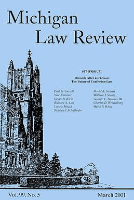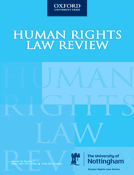
Journal of Supreme Court History
Scope & Guideline
Exploring the Legacy of Justice
Introduction
Aims and Scopes
- Historical Analysis of Supreme Court Decisions:
The journal focuses on detailed examinations of landmark Supreme Court cases, exploring their historical significance, legal reasoning, and societal impact. - Biographical Studies of Justices:
It includes biographical accounts and analyses of key figures in the Supreme Court, highlighting their contributions, controversies, and legacies. - Thematic Studies on Civil Rights and Legal Liberalism:
The journal consistently addresses themes related to civil rights, legal liberalism, and the changing dynamics of the Court's decisions in these areas. - Contextual Examination of Judicial Politics:
It explores the political contexts surrounding Supreme Court decisions, including the influence of presidential administrations and legislative actions. - Engagement with Contemporary Legal Issues:
The journal also discusses contemporary legal issues and their historical roots, providing a bridge between past and present judicial challenges.
Trending and Emerging
- Civil Rights and Social Justice:
There is a growing focus on civil rights cases and their implications for social justice, reflecting a broader societal push for equality and the historical role of the Supreme Court in advancing or hindering these movements. - Political Dynamics and the Supreme Court:
Recent publications increasingly analyze the political dynamics surrounding Supreme Court nominations and decisions, particularly in light of recent contentious appointments and legislative battles. - Interdisciplinary Approaches to Legal History:
The journal is embracing more interdisciplinary perspectives, incorporating insights from fields such as sociology, political science, and cultural studies to enrich the understanding of Supreme Court history. - Exploration of Gender and Race in Judicial Contexts:
There is an emerging trend towards exploring the roles of gender and race within the Supreme Court's history, highlighting the contributions of underrepresented groups and the impact of their cases.
Declining or Waning
- Focus on Early Supreme Court History:
There appears to be a diminishing emphasis on the early years of the Supreme Court, particularly the foundational cases from the 18th and early 19th centuries, as more recent historical analyses gain traction. - Less Attention to Non-Judicial Figures:
The journal has shifted away from examining figures outside the Court, such as legislators or political activists, who influenced judicial decisions, indicating a narrowing of focus primarily on justices. - Reduced Coverage of Procedural Aspects of Law:
There has been a noticeable decrease in articles that analyze procedural aspects of law or court operations, as the emphasis moves toward substantive legal analysis and case outcomes. - Declining Interest in Historical Legal Doctrines:
The journal has seen fewer articles dedicated to the historical evolution of specific legal doctrines, suggesting a potential shift towards more contemporary applications of law.
Similar Journals

AUSTRALIAN LAW JOURNAL
A Legacy of Excellence in Legal ScholarshipThe Australian Law Journal, published by Lawbook Co Ltd, has long been a cornerstone in the legal scholarly community, serving as a vital resource for legal practitioners, scholars, and students since its inception. With an ISSN of 0004-9611, this esteemed journal provides a platform for a diverse array of legal discourse, ranging from analyses of contemporary law to examination of historic legal principles. Though traditionally not open access, the journal continues to uphold a commitment to excellence through a rigorous peer-review process, thus ensuring high-quality research dissemination. The journal's extensive archives reflect its long-standing relevance, covering various periods including 1974 onward, with significant contributions made between 1976 to 1978, 1986 to 1988, and 1993, among others. Engaging with this publication is essential for those seeking to advance their understanding of Australian law and its application, making it an invaluable resource for anyone involved in legal studies or practice.

MICHIGAN LAW REVIEW
Advancing Legal Thought One Article at a TimeMICHIGAN LAW REVIEW, published by the Michigan Law Review Association, stands as a prestigious journal in the field of law, offering an influential platform for critical legal scholarship and discussion. With an ISSN of 0026-2234 and an E-ISSN of 1939-8557, this journal features a longstanding commitment to analyzing contemporary legal issues and contributing to academic dialogue. Situated in the United States, the journal reflects a rich historical legacy, with converged publication years stretching from 1974 to present, thereby preserving its position as a key resource for legal researchers and practitioners. Ranked in the Q1 category within its field for 2023, and holding a notable Scopus rank of 276 out of 1025 in the Social Sciences _ Law category, it plays a critical role in shaping legal thought and policy. Although not open access, its detailed articles and comprehensive reviews are instrumental for law students, academics, and legal professionals who seek to stay at the forefront of legal scholarship.

European Law Review
Exploring the Depths of European Legal ScholarshipEuropean Law Review is a prominent academic journal dedicated to the comprehensive analysis and critical exploration of European legal issues. Published by SWEET MAXWELL LTD in the United Kingdom, this journal serves as a vital platform for scholarly discourse within the field, holding a commendable Q2 ranking in the Law category as of 2023. The journal's articles encompass a range of topics, including European Union law, human rights, and comparative legal studies, appealing to researchers, professionals, and students alike. With an H-index that reflects its academic influence and a solid Scopus ranking in the social sciences, the European Law Review remains an essential resource for those engaged in legal research and practice. While it is not an open-access journal, it offers rich, peer-reviewed content aimed at advancing knowledge and understanding of European law dynamics from 1995 to the present day.

Russian Politics
Charting New Territories in Russian Political ResearchRussian Politics, published by BRILL, is a leading interdisciplinary journal that delves into the complexities of political dynamics, cultural influences, and historical contexts within Russia and beyond. With an ISSN of 2451-8913 and an E-ISSN of 2451-8921, this journal has gained significant recognition, achieving a Q1 ranking in both Cultural Studies and History, as well as a Q2 ranking in Political Science and International Relations and Sociology for 2023. The journal, located at PLANTIJNSTRAAT 2, P O BOX 9000, 2300 PA LEIDEN, NETHERLANDS, serves as an essential platform for scholars, practitioners, and students, offering cutting-edge research and discussions on the political landscape and societal trends within Russia. With a commitment to comprehensive scholarship and a wide-ranging scope, it is positioned as more than just a publication; it is a vital resource for anyone seeking to understand the intricate tapestry of Russian politics.

Human Rights Law Review
Illuminating the Path to Justice and EqualityHuman Rights Law Review, published by Oxford University Press, is a premier academic journal dedicated to the advancement of scholarship in the field of human rights law. With a distinguished ISSN of 1461-7781 and known for its impactful contributions, the journal has achieved a remarkable reputation, being classified in the Q1 Quartile in Law and Q2 Quartile in Sociology and Political Science as of 2023. Boasting a notable Scopus ranking of #227 in Law and #505 in the social sciences, the journal is a vital resource for researchers, legal professionals, and students alike, facilitating critical discourse and the dissemination of groundbreaking research from 2005 to 2024. The Human Rights Law Review is committed to exploring the complexities of human rights within legal frameworks, thereby enriching the global understanding and advocacy of these essential rights. As a principal outlet for scholarly work in this vital area, the journal features a wide range of articles that not only examine legal provisions but also interrogate the sociopolitical contexts impacting human rights worldwide.

Adelaide Law Review
Navigating the complexities of law with clarity and expertise.The Adelaide Law Review, published by the University of Adelaide, stands as a notable journal in the field of law, offering valuable insights into a wide range of legal topics relevant to practitioners, scholars, and students alike. With an ISSN of 0065-1915 and a history of publication that has evolved from 2019 to 2023, it serves as a platform for the dissemination of rigorous legal scholarship. Although currently categorized in Quartile 4 within the law category, the journal remains instrumental in contributing to legal discourse, particularly in the Australian context. With a Scopus ranking of #733 out of 1025 and a 28th percentile ranking in Social Sciences Law, the Adelaide Law Review is committed to advancing the understanding of vital legal issues through thoughtful articles, case analyses, and critical commentaries. This journal provides an essential resource for legal professionals and academic researchers seeking to engage with contemporary legal challenges. While it does not offer open access at this time, its scholarly contributions ensure it remains a respected publication within the legal community.

SYDNEY LAW REVIEW
Exploring the Intersection of Law and SocietySYDNEY LAW REVIEW is a prestigious academic journal published by the Sydney Law School, dedicated to the field of legal studies and interdisciplinary analysis of law and its impact on society. With its ISSN 0082-0512 and E-ISSN 1444-9528, this journal serves as a vital resource for legal scholars, researchers, and practitioners in Australia and globally. The journal has undergone several phases since its inception in 1990, reflecting the evolving landscape of legal scholarship and policy. Although currently not an open-access publication, it remains a significant contributor to legal discourse, maintaining a Q4 ranking in the Law category as per the 2023 category quartiles. The SYDNEY LAW REVIEW encourages submissions that critically explore contemporary legal issues, thereby fostering a robust platform for academic inquiry and professional advancement.

Revista General de Derecho Europeo
Advancing Legal Scholarship Across EuropeRevista General de Derecho Europeo is a prestigious academic journal dedicated to the study of European law, published by IUSTEL, a notable publisher recognized for its commitment to legal scholarship. This journal serves as a vital platform for the dissemination of cutting-edge research, fostering dialogue among scholars, practitioners, and policymakers in the field of European legal studies. With an ISSN of 1696-9634, it provides no-cost access to a diverse range of articles, ensuring that the latest developments in European jurisprudence are readily available to a broad audience. Although specific impact metrics such as the H-index are not detailed, the journal’s emphasis on quality and relevance positions it as an essential resource for anyone engaged in exploring the complexities of European law, its implications, and its evolution within a global context. Revista General de Derecho Europeo not only contributes to academic discourse but also equips its readers with critical insights necessary for navigating contemporary legal challenges in Europe.

London Review of International Law
Exploring the Dynamics of Global Governance through LawThe London Review of International Law, published by Oxford University Press, is a prominent journal dedicated to advancing scholarship in the field of international law. With a focus on fostering critical discourse and interdisciplinary engagement, this periodical offers a platform for researchers, practitioners, and students to explore contemporary legal issues shaping global governance. Although the journal operates as a subscription-based resource, it does not currently provide open access options, thereby ensuring a curated selection of high-caliber, peer-reviewed articles intended to uphold rigorous academic standards. Since its inception in 2013, the London Review of International Law has been recognized within the Q3 category in Law for 2023, and it holds a respectable rank of #628 out of 1025 in the Scopus Law category. As the journal continues to innovate and reflect the dynamic nature of international legal discourse, it remains an essential resource for legal professionals and academics alike, enhancing their understanding and engagement with pressing global legal challenges.

Law & Practice of International Courts and Tribunals
Illuminating the Pathways of International AdjudicationLaw & Practice of International Courts and Tribunals is a prestigious academic journal published by BRILL, focusing on the interplay between international law and the functioning of international courts and tribunals. Since its inception in 2007, the journal has established itself as a crucial platform for scholarly discourse, achieving a Q1 ranking in Law and notable placements in categories such as Political Science and Sociology. With a commitment to advancing knowledge, it serves researchers, practitioners, and students alike, facilitating a deeper understanding of the legal frameworks that govern international adjudication. Despite its non-open access model, the journal's content is highly regarded for its rigorous peer-reviewed articles, which lend critical insights into evolving legal practices and cultural dialogues within the international legal community.